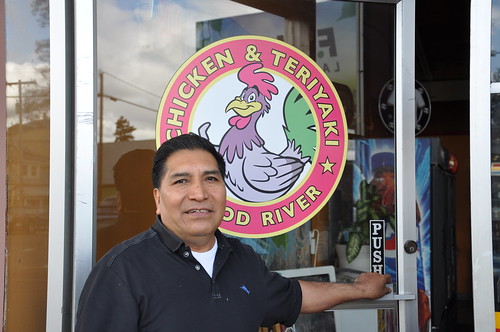
As a first-time small business owner, Nabor Ceja, has learned a lot since opening his restaurant, Chicken & Teriyaki, in Hood River, Oregon. Like many immigrants, Mr. Ceja wasn’t familiar with local processes and requirements for things like business registration, tax numbers, insurance, permits, licensing, hiring and employer obligations. With limited English proficiency, just asking the different agencies and offices for help was a significant barrier.
Mr. Ceja is not alone. Thirty percent of the population in Hood River County is Hispanic. Until recently, however, there were no small business assistance providers meeting the unique needs of the Hispanic community.
Gabriel Muro is the business services coordinator at a social services nonprofit called The Next Door. “I have met so many people who start businesses using their personal accounts, or who don’t get their W-9 forms submitted in time to demonstrate legal status and claim important exemptions. All of these things are done differently in Mexico.”
These items--and many more--each affect the bottom line and can have a significant impact on whether a small business can actually stay in business.
Economic growth in any rural community is, for its own sake, vitally important. It is especially so in Hood River County’s Hispanic community, where 50 percent of families live in poverty even though many came to the area specifically for the work. In the region’s fruit orchards, however, the employment and paychecks are often seasonal, and there are plenty of lean times no matter how hard one is willing to labor.
Many see a solution in growing Hispanic business ventures to create new income and employment opportunities. To support emerging entrepreneurs and the many benefits they bring to the overall community, The Next Door started a program called Promoviendo Prosperidad, or Promoting Prosperity. Through the program, Gabriel Muro is providing 26 Hispanic and Latino business owners and entrepreneurs with culturally appropriate, Spanish-language start-up and development services including business planning, guidance with registration and permit processes, access to financing options, application assistance for energy incentive programs, and much more.
The program received funding support from USDA Rural Development’s Rural Business Enterprise Grant (RBEG) program and the National Association of Latino Asset Builders.
“Promoviendo Prosperidad is a perfect example of how USDA is investing in locally led, partnership efforts to provide pathways out of poverty and grow the middle class in rural America,” said USDA Rural Development State Director Vicki Walker.
The local small business development center and economic development district have also joined the effort as partners to provide additional expertise.
Nabor Ceja is grateful for the guidance, which has helped him successfully apply for state energy incentives, advertise and network through the local chamber of commerce, and source fresh, local produce at affordable prices.
He’s also capitalizing on what makes his restaurant unique. You see, Mr. Ceja not only dishes up authentic Mexican food, as do several other eateries in the immediate vicinity, he is also the only nearby business serving teriyaki. With business technical assistance through Promoviendo Prosperidad, he’s now developing a label so he can bottle his top-secret teriyaki sauce for retail sales.

